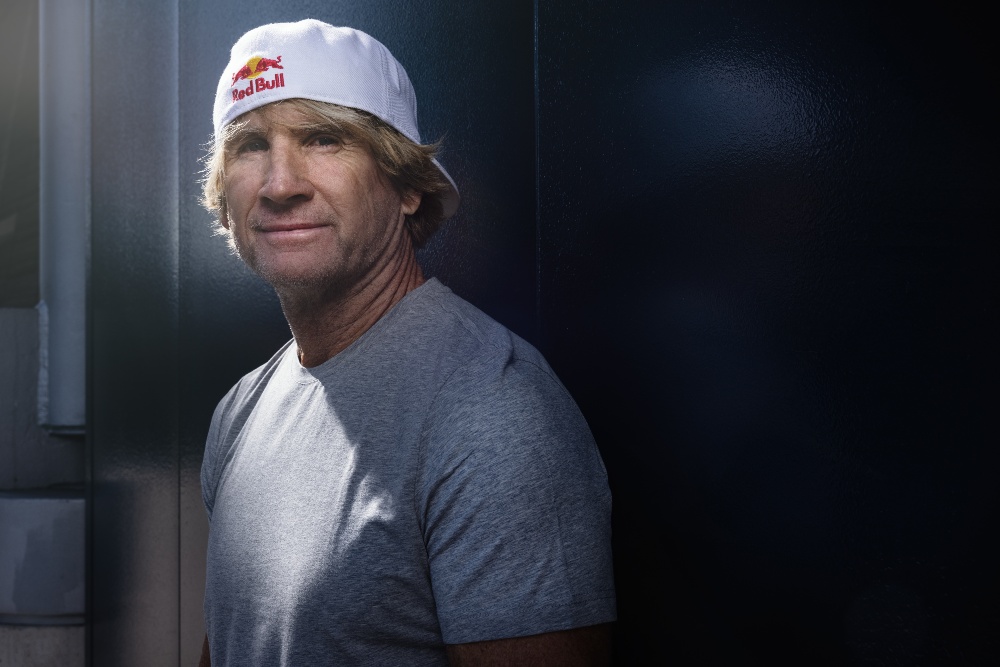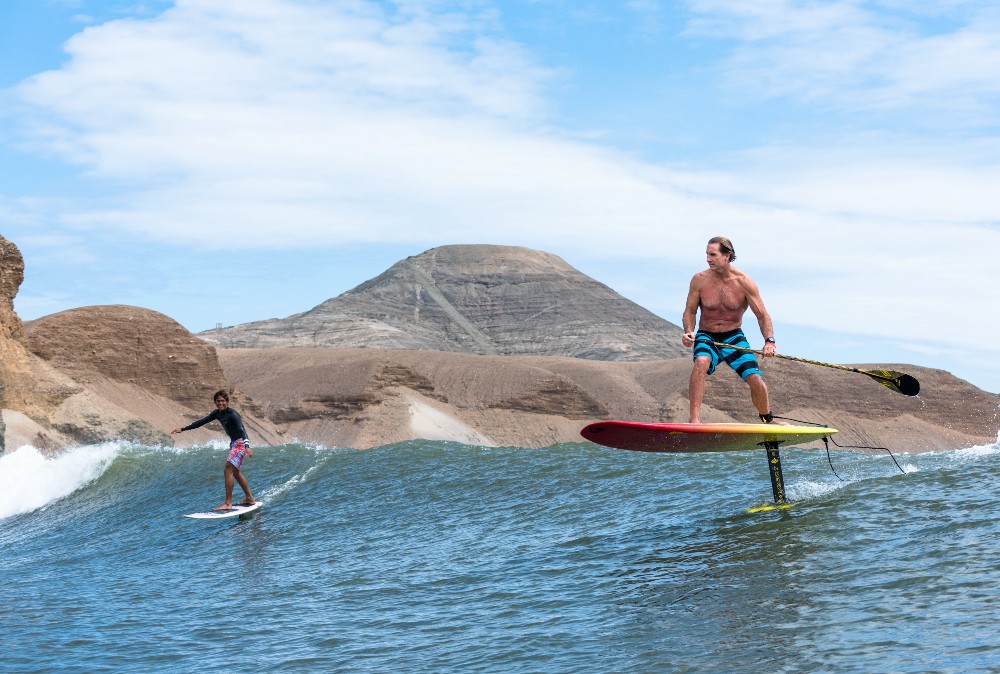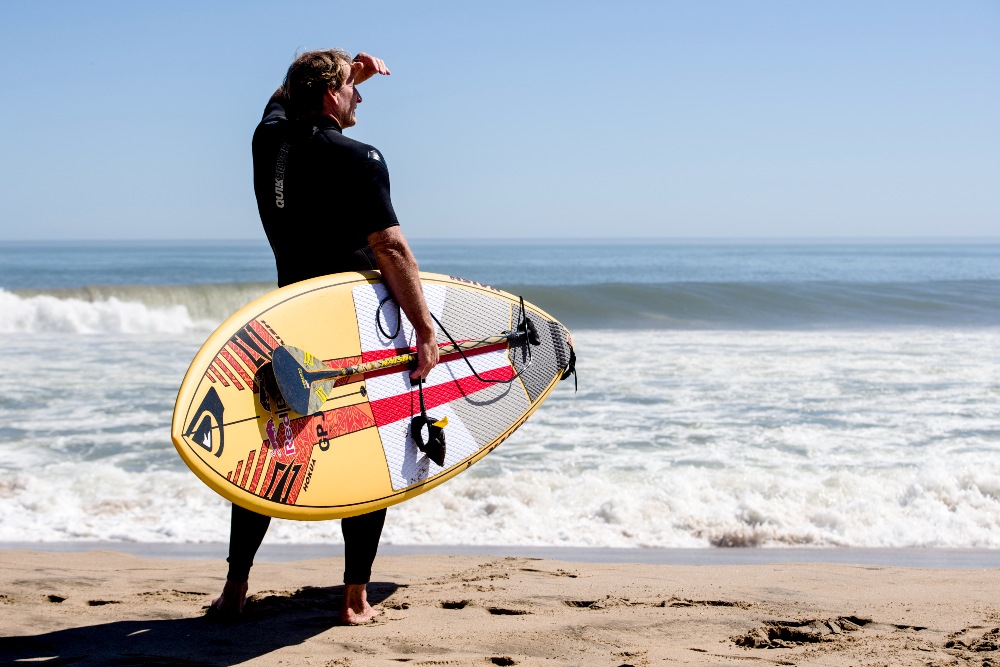
24-time windsurfing world champion, Robby Naish, is at the centre of a new documentary by director Joe Berlinger airing on Red Bull TV – The Longest Wave.
Despite the 58-year-old still being active in windsurfing, kitesurfing and surfing, Naish only does it for fun now and stopped competing which is what he’d been doing since he was 13 years old.
However, the Maui resident still wanted to challenge himself by riding the longest wave, which is what the documentary focusses on, but if you’re looking for pure action you won’t find it here – the excitement is complimented with raw emotion from Naish.
Naish revealed what to expect from the film, why he wanted Berlinger to make it, spoke about how he used to deal with pressure when he was competing and explained why he’s taking things day by day and has no current long-term plans.
Do you think 13-year-old Robby thought you’d still be out on the water windsurfing at 58?
The 13-year-old Robby would have no clue. I know as I got older, I had hopes, I tried to set myself up to keep things rolling. I never had a long-term vision for anything, I’ve always lived trying to keep the good things going and avoid the bad things in life. But I’ve always known at least that there’s never any guarantees – an injury could end my career. There’s a lot of things that are out of your control, so I was at least trying to do the things that were in my control. Hopefully I keep having good luck and can keep it going.
From the very beginning to me there was this acute awareness that luck played a huge role in all of my accomplishments, being at the right place at the right time to have an opportunity to do what I do. I kind of started learning that if you work hard enough and you make the right decisions you can create luck or you can at least set yourself up to have a pretty good chance of having good luck over bad luck.
It’s not always the case, there’s many things you can’t control in life, but it’s good to know that you’re at least living in such a way that things that you do have control of are clearing the pathway a bit. I’ve been really lucky and as I got older I had more and more and more appreciation for how lucky I am to continue to be able to live this way and get paid to do what I get to do.
At which point did you realise that you could make a career out of windsurfing?
It was only later on because in the beginning, 1976 in the Bahamas through mid-year ’81 it was just amateur, there was no career in windsurfing, I was purely doing it for the love and all those world titles were just amateur. It was actually a big decision in 1981 whether I was going to turn professional or stay amateur because to go to the Olympics in 1984 you had to be amateur. If you took one dollar for your sport you were out.
I wasn’t really sure; the Olympics was a big dream for everybody back then. But it was 1981, we have ’82, ’83, ’84 – who knows what’s going to happen in the years between now and then, maybe I’m not even that good anymore or maybe I go to college, and I lose interest, who knows. I said alright I’m going to try this professional windsurfing and see what happens. That’s literally when it just began, my first sponsors, the first pro-events.
It wasn’t until a couple of years into that where it looked like wow it’s still growing; there’s more money and more sponsors and windsurfing is getting huge. I said maybe this will last a year or two, we’ll see so I’ll keep trying, and it’s still going today. It’s been a fun past, no question.

Did you put pressure on yourself when you used to compete or did you have the mindset that you’d try your best and whatever happened, happened?
No, I put a lot of pressure on myself. I’m a good winner, I’m not a celebrator but I’m a poor loser, I hate losing. I don’t want to do things, competing at least – I don’t mind just going for fun – but if I’m going to compete in something I want to do well. If I’m not doing well, I don’t enjoy it at all. There’s pretty good incentive to really try to set myself up to be successful and competitive.
If I was windsurfing this whole time and getting 20th place, I would have quit competition decades and decades and decades ago. To me it was about if I’m going to compete, I have to be amongst the front or at least competing for the front and that took a lot of pressure. It was self-inflicted pressure – I didn’t have coaches and I didn’t have trainers; my parents weren’t standing on the beach yelling at me. I was out there on my own, so it was healthy pressure, I think.
How long does that winning feeling stay with you?
I would immediately focus on the next one [event]. I was even the kind of guy that would ride the gear that I would have to use, and I knew the conditions were going to be that way at the next event, maybe there’s going to be really good conditions or something else. And I would be like I’m going to ride this gear because I know that’s what I’m going to be using on silt. As soon as one event was done there was no celebrating it was straight back into it, trying to stay focussed and get ready for the next one. But I enjoyed that pressure, it’s not like it became work and I didn’t love it, I loved that pressure, I loved the fact that I was trying to be at the top of my game – it felt good.
If I spun out and got lazy or missed a good day training or something I’d be bummed out like am I losing it, what’s going on? It lasted an awfully long time, it’s still kind of there on a different level, I’m not competing now but I’m planning to be out there and not to the point where it’s unhealthy but to the point where it’s at least keeping me motivated to stay in shape. I never got fat, I don’t drink, I don’t smoke, I’m not hanging out with my friends watching football instead of going when the waves are good, I’m still out there so it’s still my priority.
Why did you stop competing in windsurfing and how tough was it to stop?
Most athletes get to a point, and they’ll know that their last event. They’ll know at what point and event they stopped – I don’t have that. With windsurfing we have different disciplines and I stopped doing course racing, as the sport evolved and changed, I wasn’t really that competitive anymore, but I kept doing slalom and wave. Then eventually I stopped doing slalom as well because you had to be 100 kilos to be competitive and I was no longer competitive. I kept doing the waves. And then as I was kind of transitioning out of my focus on the waves kitesurfing came along and I started competing in all the kite events around the world.
So, when I stopped competing in windsurfing, I was full on competing in the kite tour all over the world and that lasted a few years. By the time I transitioned out of kiting events it was easing and I would still do a couple of windsurfing events a year like here on Maui I would do the Aloha Classic which I still do occasionally.
I started doing SUP (stand up paddle) events in Hawaii in the early days of SUP. So, there wasn’t this point at which there was a big hole in my life that was left when I stopped or a cliff that I fell off of emotionally because I stopped competing.
By the time I stopped competing altogether which I guess I have now - I did the Aloha Classic three years ago - by the time I got there I was ready, I was over the whole points thing and really enjoying doing these sports just for fun and not having the pressure of trying to compete at points and a ranking. Most of these sports are also not really competition based, the competition is a little box that we create in order to get paid to surf or to windsurf or to kitesurf.
In tennis you’re competing, even if you’re not, even if you’re hitting the ball against the other person, it’s still kind of a competition, most sports have a competitive base but surfing and windsurfing and kiting, the essence of the sport has nothing to do with competition. So, transitioning out of competition opens your world up a little bit more to new things in the sport because you’re not putting yourself in that box. I enjoyed the life of competing and I think it made it really easy on me not to have just stopped all at once.

How did you come to the decision that you wanted to ride the longest wave?
It was more hey let’s just do this. People asked me to do a film for years and years and years and I always said no, I’m not ready yet, I don’t want to look back, I want to look forward. And then we finally decided to do something, we didn’t know what we wanted to do, I didn’t know which sport to focus on and we needed some sort of string to have a reason to watch the film in the first place and it was like well maybe the longest wave. I didn’t want to do a big wave thing because everybody’s doing big wave thing, like riding the biggest waves in the world kind of thing. So, we figured the longest wave would be different, it would bring us around the world, it would bring people in as a tag to follow.
That was the idea, it just started from there and off we went and by the end of the movie that became a metaphor for the making of the film because it took so long, it took years to finish because of injuries and whatnot. And a metaphor for my life in general and my career – the longest wave. We didn’t even measure the waves in the end of the film, we didn’t check the distance, the time, it didn’t even matter. It was no longer the goal to quantify things it just became – let’s get some good waves, that’s it. The essence and the purity of surfing without putting it into that quantifiable box felt good in the end. People watch the movie, and they go: “But how long was the wave?” It doesn’t matter.
The documentary is full of raw emotion, but did you expect that to be the case before filming or did it just happen along the way?
It just kind of happened, I mean when Joe Berlinger decided to do the film and I met him and I looked at the documentaries that he’s made - he’s never made a sports film, he didn’t know who I was – he was clearly a guy that would come in and do something different, looking at it from a different perspective and not a traditional sports documentary guy. And that was appealing, I wanted something unexpected, I didn’t want it maybe this unexpected. No one goes into something going yeah, I’m going to really mess myself up and get divorced and have financial issues and on and on and on in the middle of making a feature film. But it gave him a lot to work with.
It’s brutally honest, there’s things in there where people are watching going: “Wow, I can’t believe you did that in front of the camera.” Learning how to do new things in front of the camera happens in the film as well. But it’s real and I wanted something real and different, and I think people are appreciating that, it’s definitely not just action p*rn which is what a lot of people expect. In the world of Red Bull, it’s action, action, action and there’s definitely some amazing action and some great opportunities to see beautiful wind and waves in the film but there’s more than that, which is cool.
How excited are you for UK audiences to be able to watch the documentary for free on Red Bull TV?
I’m excited at this point because it’s been a long journey. The film has now kind of been in limbo as have most people’s lives because of Covid. We launched right literally at the beginning of Covid going onto a film festival tour and it was initially supposed to be cinematic release and so they were waiting for cinemas to re-open and obviously like with everything else in the world and life it’s been a moving target. One day you’re wearing masks and the next day you don’t have to wear masks and now you have to do this and now you don’t have to do that. We couldn’t have had a worse time to launch a film in terms of wanting to get it out right away because the target kept moving.
It’s nice that it’s finally going to get out there and people are going to be able to see it because it was a lot of work from a lot of different people, not just me. Joe Berlinger, the director, and all the filming guys and sound guys – it was a fairly big production, Red Bull put a lot into it and it’s a shame to see nobody see it. You just want to get it out and people are asking me: “When is the movie coming out?” It’s finally coming out and that feels good not for my ego but just for the project in general that it’s finally coming to fruition and people will be able to see it.
What’s next for you?
I’m kind of taking it day by day, it’s really difficult to plan right now because of Covid. I’m lucky because I live on Maui, if anywhere in the world was a good place to live through this. Again, I’ve been lucky to be in this place, we’ve had not really much in terms of restrictions, very few Covid cases, it’s not a big deal here and obviously I live in paradise to begin with so that’s been lucky. But impossible to plan.
I made it to Europe last month for a couple of weeks doing some promotional stuff which felt good. I’d been travelling since I was 13 years old and being a year at home was really strange, it felt really awkward, so it was good to get back on the road and feel like I was really doing something. Until things get back to normal, if they even get back to normal, it’s hard to plan so at the moment I’m going with the flow and riding every day and developing new gear and trying to stay fit and see what comes.
The film premieres August 10th only on Red Bull TV, a free, on demand streaming service available on the web and as an app across devices big and small. Watch the premiere here –https://www.redbull.com/int-en/films/the-longest-wave.
Words by Lucy Roberts for Female First, who you can follow on Twitter, @Lucy_Roberts_72.
RELATED: Official trailer for Robby Naish documentary The Longest Wave is unveiled
Tagged in celebrity interview

